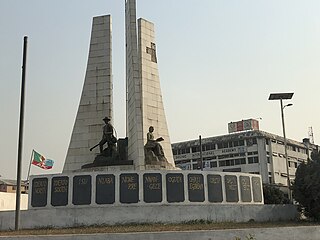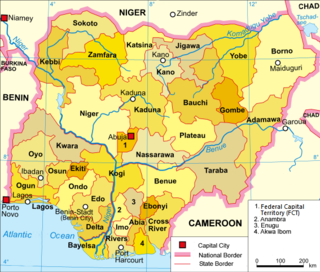
The Catholic Church in Nigeria is part of the worldwide Catholic Church, under the spiritual leadership of the Pope, the curia in Rome, and the Catholic Bishops' Conference of Nigeria (CBCN). The present president of the CBCN as of 2020 is Augustine Obiora Akubeze, Archbishop of Benin city, who was preceded by the Archbishop of Jos Catholic Diocese, Ignatius Kaigama.

Abia State is a state in the South-East geopolitical zone of Nigeria, bordered to the north and northeast by the states of Anambra, Enugu, and Ebonyi, Imo State to the west, Cross River State to the east, Akwa Ibom State to the southeast, and Rivers State to the south. It takes its name from the acronym for four of the state's most populated regions: Aba, Bende, Isuikwuato, and Afikpo. The state capital is Umuahia while the largest city and commercial centre is Aba.

Anambra State is a Nigerian state, located in the southeastern region of the country. According to the 2006 census report there are over 4.1 million residents in the state. The state name was formed in 1976 from the former East Central State, the state is named after Omambala River, a river that runs through the state. Anambra is the anglicised version the British Colonialists used to refer to the Omambala. The state capital is Awka, a rapidly growing city that increased in population from approximately 300,000 to 2.5 million between 2006 and 2018. The city of Onitsha, a historic port city from the pre-colonial era, remains an important centre of commerce within the state.

Ebonyi State is a state in the South-East geopolitical zone of Nigeria, bordered to the north and northeast by Benue State, Enugu State to the west, Cross River State to the east and southeast, and Abia State to the southwest. Named for the Abonyi (Aboine) River—a large part of which is in the state's south—Ebonyi State was formed from parts of Abia and Enugu state in 1996 and has its capital as Abakaliki.

Enugu State is a state in the South-East geopolitical zone of Nigeria, bordered to the north by the states of Benue and Kogi, Ebonyi State to the east and southeast, Abia State to the south, and Anambra State to the west. The state takes its name from its capital and largest city, Enugu.

Prince Abyssinia Akweke Nwafor Orizu. was a Nigerian of Igbo origin and Nigeria's second Senate President from 16 November 1960 to 15 January 1966, during the Nigerian First Republic. Orizu was also Acting President of Nigeria from late 1965 until the military coup of January 1966. He was a member of the Nnewi Royal family. His nephew Igwe Kenneth Onyeneke Orizu III is the current Igwe (King) of Nnewi Kingdom. Nwafor Orizu College of Education in Nsugbe, Anambra State, is named after him.

The Aro people or Aros are an Igbo subgroup that originated from the Arochukwu kingdom in present-day Abia state, Nigeria. The Aros can also be found in about 250 other settlements mostly in the Southeastern Nigeria and adjacent areas. The Aros today are classified as Eastern or Cross River Igbos because of their location, mixed origins, culture, and dialect. Their god, Chukwu Abiama, was a key factor in establishing the Aro Confederacy as a regional power in the Niger Delta and Southeastern Nigeria during the 18th and 19th centuries.
Obinze is a community in southeastern Nigeria, located near the city of Owerri, Imo State. A peaceful community under the supervision of Owerri West Local Government Area. The community Obinze had six clans/villages but a clan known as Umuanunu got their own autonomous community and pulled out. A community known for its high fast rise in industrialization due to its location along Owerri-Port-harcourt Road, giving hosts/non-indigents access to the Local government area, State capital and neighbouring state such as Abia State, Anambra state and Rivers State. Obinze shares boundaries with Oforola, Avu, Ihiagwa, Eziobodo, Umuokani, Nekede and Mbirichi etc.

Imo State is a state in the South-East geopolitical zone of Nigeria, bordered to the north by Anambra State, Rivers State to the east and south, and Abia State to the west. It takes its name from the Imo River which flows along the state's eastern border. The state capital is Owerri and its state nickname is the "Eastern Heartland."
The Nigerian Society of Chemical Engineers (NSChE) is an organization for chemical engineers in Nigeria. NSChE was officially inaugurated on 12 March 1969 at a meeting at BP House in Lagos attended by twenty four Chemical Engineers, all trained abroad. In 1999 it became a Division of the Nigerian Society of Engineers. The Society publishes the Nigerian Society of Chemical Engineering Journal.
Federalism in Nigeria refers to the devolution of self-governance by the West African nation of Nigeria to its federated states, who share sovereignty with the Federal Government.

Rear Admiral Allison Amaechina Madueke is a retired Nigerian naval officer. He was Chief of Naval Staff from 1993 to 1994, military governor of Anambra State from January 1984 to August 1985, and Imo State military governor from 1985 to 1986.

Anthony Ukpabi Asika was a Nigerian academic and civil servant. He served as the Administrator of East Central State during the military regime of General Yakubu Gowon, appointed when his predecessor, the Eastern Region governor Chukwuemeka Odumegwu Ojukwu, led the Biafran state into secession.
This article is about the particular significance of the year 2008 to Nigeria and its people.
South East of Nigeria is one of the six geopolitical zones in the country. The region consists of the following states;

Raymond Iheanacho Nkemdirim is a former Director of Operations of the Department Of State Security Services DSS and Special Assistant to the Director-General, DSS, a position he held until 2015. He joined the then Nigerian Security Organisation (NSO) in 1979. When in 1986, the NSO was re-organized and the State Security Service (SSS) emerged, he transferred his service to the SSS.
Nigeria Erosion and Watershed Management Project (NEWMAP) is a World Bank assisted project aimed at addressing the Nigerian gully erosion crisis in Southeastern Nigeria and land degradation in Northern Nigeria on a multi-dimensional scale. This project was born out of the request for assistance made by President Goodluck Ebele Jonathan to World Bank in 2010. He requested for assistance in tackling severe gully erosion in Southern Nigeria, land degradation in Northern Nigeria and environmental insecurity.

Lists of Nigerian state governors cover the governors of states of Nigeria. The governor heads the executive branch of the state government, and can appoint people to the State Executive Council subject to the advice and consent of the State House of Assembly (Legislature). The lists include a list of current governors, lists by state, lists by period and a list of governors of former states.
The insurgency in Southeastern Nigeria is a military conflict that broke out in the city of Orlu, Nigeria on 22 January 2021, when the Nigerian Army moved to crush the paramilitary wing of the Indigenous People of Biafra (IPOB), the Eastern Security Network (ESN). The conflict escalated after the ESN managed to repulse the initial push by the Nigerian Army, but IPOB ended the initial crisis by unilaterally withdrawing the ESN from Orlu. After a few weeks of quiet, Nigeria launched a military offensive in the area to destroy the ESN. On 19 February 2021, IPOB declared that as of the day before, a state of war existed between Nigeria and Biafra. Three weeks later, another separatist group declared the formation of a Biafran interim government which was subsequently endorsed by IPOB. Since then, the Biafran separatists have begun to form alliances with other separatist groups in Nigeria and Cameroon. Despite these developments, the separatists claimed that their militant operations were mainly aimed at defending local communities from armed herders and bandits instead of fighting the Nigerian government. In late June, IPOB leader Nnamdi Kanu was arrested by Interpol and handed over to Nigerian authorities.

The Enugu-Port Harcourt Expressway was constructed in the late seventies during the military regime. The route connect the country's five states in the country's South-East Geopolitical Zone. The highway runs for 41.4 kilometres, beginning at the Aba Rail Crossing Bridge in Aba township in Abia state and ending at the Eleme Junction Flyover in Port Harcourt, Rivers state.













